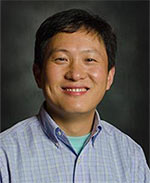Date
Cost
Free and open to the public
Location
Harris Corporation Engineering Center, Room 101A
Description
Polycrystalline transparent ceramics are emerging as a highly promising alternative to single crystal materials and glasses for potential utilization in a wide range of defense, optical and photonic applications, including armor protection, lasers, scintillators, and optoelectronics. To produce high quality transparent photonic ceramics for practical applications, it is essential to study the fundamental science involved in the processing of the materials. The scientific goal of these investigations is to understand the mechanisms which control optical transmittance and anti-site defect behavior in optical materials, in order to minimize defects that cause light scattering and absorption. In active pursuit of successfully processing optical quality ceramic materials, crystallographically cubic ceramics have been studied, and there has also been increasing investigation into non-cubic structure materials. However, processing anisotropic transparent ceramics presents significant challenges due to the inherent characteristics of optical anisotropy in polycrystals. An emphasis is therefore placed on improving the understanding of the effects of processing techniques on birefringence behavior in transparent photonic ceramics.
Presenter

Yiquan Wu, Ph.D.
Departments of Ceramic Engineering and Materials Science
Kazuo Inamori School of Engineering
Alfred University
Contact
Jodi Peters Materials Science & Engineering 407-823-0607 Jodi.Peters@ucf.edu